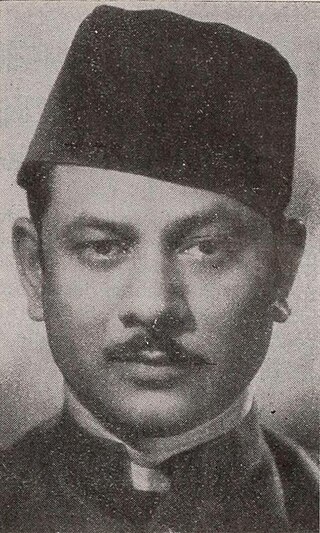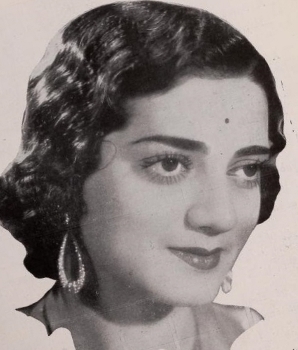Related Research Articles

Mehboob Khan was a pioneer producer-director of Indian cinema, best known for directing the social epic Mother India (1957), which won the Filmfare Awards for Best Film and Best Director, two National Film Awards, and was a nominee for the Academy Award for Best Foreign Language Film. He set up his production company – Mehboob Productions, and later a film studio – Mehboob Studios in Bandra, Mumbai in 1954. He also created the dacoit film genre with Aurat (1940) and Mother India, and is also known for other blockbusters including the romantic drama Andaz (1949), the swashbuckling musical Aan (1951), and the melodrama Amar (1954).
Hum Tum Aur Woh is a 1938 Hindi/Urdu social drama film. The film was directed by Mehboob Khan for Sagar Movietone. The music was composed by Anil Biswas with lyrics by Wajahat Mirza and Zia Sarhadi. The cinematographer was Faredoon Irani. The film starred Motilal, Maya Banerjee, Rose, Yakub and Sankatha Prasad. The film was a romantic triangle involving Moti (Motilal), Bina the girl he's engaged to and Leela (Rose) who is obsessed with him.
Al Hilal is a 1935 Urdu/Hindi costume drama film. It was the debut directorial venture of Mehboob Khan. He went on to become "one of the pioneer directors of Indian Cinema". The film is thought to be inspired by Cecil B. DeMille's The Sign of the Cross. The film was produced by Sagar Movietone. The director of photography was Faredoon Irani. The music composer was Pransukh Nayak with lyrics by Munshi Ehsan Lucknavi. It starred Kumar, Indira, Yakub, Sitara Devi, Kayam Ali and Mehboob Khan. The film depicted fictionalised history in the form of a Roman-Arab conflict, with the son of the Ottoman Empire being captured by the Roman army and his escape from them.

Watan (transl. Homeland) is a 1938 Hindustani costume drama film directed by Mehboob Khan. Produced by Sagar Films, the film had story by Mehboob Khan and Wajahat Mirza. The cinematographer, as for most Sagar films, was Faredoon Irani. Following the successful music of Manmohan (1936), Sagar Movietone retained Anil Biswas as the in-house music director, scoring music for Watan along with other releases of the time from the studio. The cast of the film included Kumar, Bibbo, Maya Banerjee, Yakub Lala, Sitara Devi and Kayam Ali.
Manmohan is a 1936 Indian Urdu/Hindi-language romantic tragedy film directed by Mehboob Khan. This was Khan's third film for Sagar Movietone after Al Hilal (1935) and Deccan Queen (1936). The cinematographer was Faredoon Irani who, starting from Mehboob Khan's Al Hilal (1935), went on to establish a long working relationship with him lasting till Khan's last film Son of India (1962). The music was composed by Ashok Ghosh assisted by Anil Biswas. The story writer was Zia Sarhadi who also wrote the lyrics, screenplay and dialogue in addition to acting in the film. Though he had started his writing career on Khan's backing for Deccan Queen (1936), it was with Manmohan that he achieved success. The film was inspired by Devdas, (1935), which was a big hit at the box office. Surendra was chosen as the singing star to rival K. L. Saigal from New Theatres Calcutta, whose songs from Devdas had mesmerised the nation. Though Manmohan was referred to as the "poor man's Devdas" the film went on to do well and the songs became very popular. The film starred Bibbo, Surendra, Yakub, Kayam Ali, Bhudo Advani and Mehdi Raza.
Jagirdar (Landlord) is a 1937 Hindi romantic melodrama film directed by Mehboob Khan, and starring Bibbo, Motilal, Surendra, Yakub, Pande, Sankatha Prasad, Pesi Patel and Maya Banerjee.

Anokhi Ada is a 1948 romantic Hindi film directed by Mehboob Khan. The story was by Zia Sarhadi, with screenplay and dialogue by Agha Jani Kashmiri. The music composer was Naushad, assisted by Ghulam Mohammed and the lyricists were Shakeel Badayuni and Anjum Pilibhiti. The director of photography was Faredoon Irani. It was produced under the Mehboob Productions banner and starred Naseem Banu, Surendra, Prem Adib, Zeb Qureshi, Reehan, Pratima Devi and Cuckoo.

Alibaba is a 1940 Urdu/Hindi fantasy film directed by Mehboob Khan for Sagar Movietone. The music was directed by Anil Biswas, with lyrics by Safdar Aah. The film was a bilingual, made in Punjabi language as Alibaba at the same time. It starred Surendra, Sardar Akhtar, Ghulam Mohammed and Wahidan Bai.
Dr. Madhurika is a 1935 social film directed by Sarvottam Badami based on a story by K. M. Munshi. The cinematography was by Faredoon Irani and the film starred Sabita Devi, Motilal, Gulzar, Bhudo Advani and Padma Shaligram. The dialogue and lyrics were by Waqif with music by Pransukh Nayak and Ashok Ghosh.
Grama Kanya is a 1936 Hindi melodrama film directed by Sarvottam Badami. The film produced by Sagar Movietone had cinematography by Faredoon Irani, story by Jayant Shyam and dialogue by Waqif. The music was composed by the renowned bhajan singer Shankarrao Khatu. The cast included Surendra, Sabita Devi, Yakub, Aruna, Kayam Ali, and Gulzar.
Jeevan Lata is a 1936 Hindi social drama film directed by Sarvottam Badami. The film was produced by Sagar Movietone and had music by Pransukh M. Nayak. Sabita Devi and Motilal paired in several films right from Motilal's first Shaher Ka Jadoo (1934), with Badami using the pair for many of the films he directed for Sagar Movietone. This was Motilal's fourth film. The film starred Sabita Devi, Motilal, Gulzar, Sankatha Prasad, Bhudo Advani and Mehdi Raza.
Kokila (transl. Nightingale) is a 1937 Hindi social family drama film directed by Sarvottam Badami. The music was composed by Anil Biswas with lyrics written by Siddiqui and Zia Sarhadi. The story was adapted from the well-known novel Kokila, written by Gujarati writer Ramanlal Vasantlal Desai. The film starred Motilal, Sabita Devi, Shobhna Samarth, Maya Bannerjee, Sitara Devi, Pesi Patel, Siddiqui and Kayam Ali.
Ladies Only is a 1939 Indian Hindi-language social comedy film directed by Sarvottam Badami. Produced by Sagar Movietone, it had music by Anupam Ghatak and starred Surendranath, Sabita Devi, Bibbo and Prabha. This was the last comedy film made by Sarvottam Badami before he left Sagar Movietone. He joined his mentor Ambalal Patel, at Sudama Pictures to start making "socially relevant" films.
Sajani is a 1940 Hindi social film directed by Sarvottam Badami for Sudama Productions. Scripted by Zia Sarhadi, the film had music by Gyan Dutt and starred Prithviraj Kapoor, Sabita Devi, Snehprabha Pradhan, Noor Jehan, Dixit, and Ghory. Badami left Sagar Movietone where he had made satirical comedies to join his "mentor" Ambalal Patel at Sudama Productions to make "socially relevant film(s)", where Sajani was one of the first. Snehprabha Pradhan acted in several films produced by Chimanbhai Desai in 1940, including Sajani.
Prarthana (transl. Prayer) is a 1943 Indian Hindi-language social film directed by Sarvottam Badami for Sohrab Modi's Minerva Movietone. The music director was Saraswati Devi and the lyricist was Safdar Aah Sitapuri. Having worked for Madan Theatres Ltd and Sagar Movietone in the 1930s, the famous singer and actress Jehanara Kajjan returned to work after a hiatus of four years working for studios like Minerva Movietone. Prarthana is cited as "probably" her last film before her death in 1944. The film starred Motilal, Jahanara Kajjan, Sabita Devi, Sajjan, Nimabalkar, K. N. Singh, Sadat Ali, Mehboob and Abu Bakar.

Do Diwane also known as Be Kharab Jan, is a 1936 Hindi/Gujarati comedy film directed by Chimanlal Luhar based on K. M. Munshi's famous play Be Kharab Jan. The film was produced by Sagar Movietone and had music composed by Pransukh Nayak with cinematography by Keki Mistry. The cast included Shobhana Samarth, Motilal, Yakub, Aruna Devi, Rama Devi, Kamalabai, Kayam Ali, Pande and Pesi Patel.

Surendra was an Indian singer-actor of Hindi films. Known by his mononym, Surendra was born and educated in Punjab to be a lawyer by profession. He came to Bombay to become a singer on the recommendation of a Delhi distributor and his friends. He was "picked" by Mehboob Khan whom he met at Sagar Movietone, to sing and act in films as an alternative to the then Calcutta-based singer-actor, K. L. Saigal. Surendra started his career with his debut starring role in Deccan Queen (1936), directed by Mehboob Khan. He soon became a part of Sagar Movietone when his song "Birha Ki Aag Lagi More Man Mein" from the film became an "instant hit".

Sabita Devi (1914–1965) was a Hindi film actress in Indian cinema. She is stated to be one of the "prominent" leading ladies of the "pioneering era" of Indian cinema along with Mehtab, Bibbo, Durga Khote, Gohar, Devika Rani and Seeta Devi. A Jewish by birth, she changed her name to find acceptability in Hindi cinema like the other Anglo-Indian and Jewish actresses of her time, Sulochana, Seeta Devi, Madhuri, and Manorama. After initially working with British Dominion Films Ltd., Calcutta, she shifted to Bombay and performed mainly in films produced by Sagar Movietone with her co-star in most films being Motilal. Some of the popular films with Motilal were Dr. Madhurika (1935) and Kulvadhu (1937) directed by Sarvottam Badami. Their first film together was Shaher Ka Jadoo (1934), which was also Motilal's debut film, and then Lagna Bandhan (1936) both directed by Kaliprasad Ghosh. She acted in Silver King (1935) with Motilal. It was an action film directed by C. M. Luhar, which became a "huge success".

Sagar Movietone also Sagar Films, Sagar Film Company and Sagar Productions was an Indian film production company involved in the making of films for Indian cinema. It was launched by Ardeshir Irani with Chimanlal Desai and Dr. Ambalal Patel in 1929 in Bombay, Maharashtra, India. Sagar was initially started as a branch company of Ardeshir's Imperial Film Company. Several key figures from Imperial, such as Mehboob Khan were shifted to Sagar. The studio was in operation from 1930 to 1939. In 1940, it combined with General Pictures to form National Studios. It made "Parsi theatre based films, mythologicals and stunt movies". Sagar fostered the career of many artists who rose to prominence. Early directors such as Prafulla Ghosh, Sarvottam Badami, Ezra Mir and Nanubhai Vakil were promoted by the company. Mehboob Khan got his first break as a director in Al Hilal in 1935. He was referred to as "the most important alumnus" from Sagar, who went on to become one of Indian cinema's "most influential film-makers".

Bhudo Advani was an Indian character actor and comedian. He started his acting career in theatre with the notion of spreading awareness on social issues. He came to Bombay on the advice of an Ajanta Cinetone representative and was offered a role in the film Afzal, also called Hoor-E-Haram in 1933, directed by Mohan Bhavnani. He later joined Sagar Movietone, becoming an important fixture in most films produced by them. He turned from character roles to comedy performing in Dr. Madhurika (1935), directed by Sarvottam Badami, Deccan Queen (1936) and Do Diwaane (1936), by C. Luhar.
References
- 1 2 Crow, Jonathan (2014). "Deccan Queen 1936". Movies & TV Dept. The New York Times . Baseline & All Movie Guide. Archived from the original on 8 September 2014. Retrieved 8 September 2014.
- ↑ Ahmed, Rauf (2008). Mehboob Khan The Legends of Indian Cinema Series. Delhi, India: Wisdom Tree. p. 29. ISBN 9788183281065.
- ↑ Raj, Ashok (2009). Hero Vol.1, Volume 1 Bollywood Series. Hay House, Inc. ISBN 9789381398029 . Retrieved 8 September 2014.
- ↑ Shafique, Khurram Ali. "Obituary: Zia Sarhadi The last Reel. From The Herald". therepublicofrumi.com. Therepublicofrumi.com. Archived from the original on 4 October 2013. Retrieved 8 September 2014.
- ↑ "Deccan Queen 1936". citwf.com. Alan Goble. Retrieved 8 September 2014.
- ↑ Rishi, Tilak (2012). Bless You Bollywood!: A Tribute to Hindi Cinema on Completing 100 Years. Trafford Publishing. ISBN 9781466939639 . Retrieved 8 September 2014.
- ↑ "Deccan Queen 1936". muvyz.com. Muvyz, Inc. Retrieved 8 September 2014.